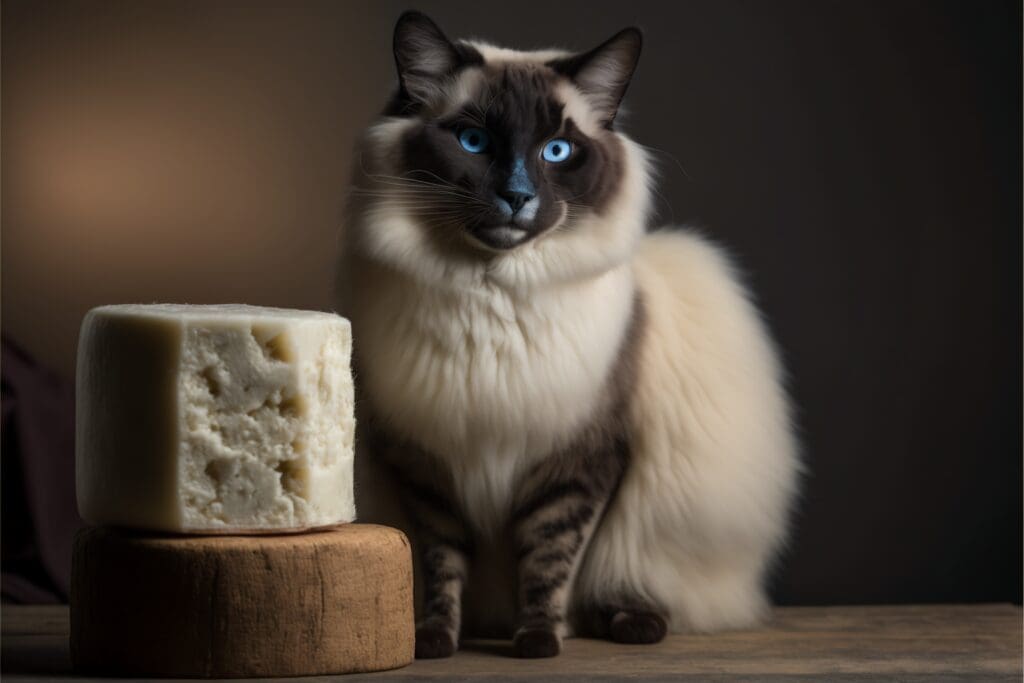Last Updated on January 8, 2023 by admin
Cats can eat goat cheese, but it should be done in moderation if at all. Goat cheese is lower in lactose than other forms of cheese, making it easier for cats to digest. However, it is still high in fat and calories and should be given to cats only as an occasional treat. Also goat cheese is high in sodium and like all other salty foods should be avoided by cats. Cheese is not toxic to cats, so it can be given to them in small amounts as a snack. It is important to remember that cats are obligate carnivores and should not be given goat cheese as part of their daily diet.
What Is Goat Cheese?
Goat cheese is a type of cheese that is made from goat’s milk. It has a distinctive, slightly tangy taste and a creamy texture. It is lower in fat and calories than many other types of cheese, and it is also easier to digest. Goat cheese is a good source of protein, calcium, and other essential nutrients, and it is often recommended as a healthier alternative to cow’s milk cheese.
Nutritional Benefits of Goat Cheese
Goat cheese is an excellent source of protein and calcium, providing cats with essential nutrients that are beneficial for their overall health. It is also low in lactose and fat, making it easier to digest than other forms of cheese. Plus, the high-quality proteins in goat cheese can help cats maintain a healthy weight and muscle mass. Goat cheese also contains beneficial fatty acids that can help keep your cat’s skin and coat healthy and glossy. All these nutritional benefits make goat cheese a great occasional treat for cats.
Is Goat Cheese Safe for Cats?
When it comes to determining whether goat cheese is safe for cats, the answer is a bit complicated. On one hand, cats are obligate carnivores, so they should not be eating any dairy products. On the other hand, goat cheese contains less lactose than cow’s milk, which makes it easier for cats to digest. So, while cats can technically eat goat cheese, it should only be done in moderation and with caution.
Finding the Right Kind of Goat Cheese for Your Cat
Once you have determined that goat cheese is safe for your cat, it is important to find the right kind of goat cheese for them. Not all goat cheese is created equal, so be sure to look for the highest quality goat cheese that does not contain artificial preservatives, flavors, or colors. It’s also important to avoid buying cheese that contains added sugar or salt, as these can be bad for your cat’s health. Be sure to read the label carefully before purchasing. Also, if you are buying pre-packaged goat cheese, make sure it is well within its expiration date.
How to Feed Goat Cheese to Cats
Now that you know it’s ok for cats to eat goat cheese, you may be wondering how to do it. Feeding goat cheese to cats is relatively simple, but there are a few things to keep in mind. First, it’s important to offer your cat a small portion of goat cheese at first. This will help you to gauge your cat’s reaction and make sure that they can handle the cheese without any adverse reactions. You can then gradually increase the portion size as your cat gets used to the taste and texture of the cheese. If your cat seems to enjoy the goat cheese, you can offer it as an occasional treat or reward.
How Much Goat Cheese Can Cats Eat?
Now that we have discussed the safety of goat cheese for cats, it’s important to consider how much they can eat. While cats can eat goat cheese, it should only be an occasional treat. Goat cheese is high in sodium, fat and calories, so it should not make up a large portion of their diet. In general, cats should only eat a small piece of cheese at a time. It is also important to introduce cheese into their diet slowly, as some cats may have difficulty digesting it at first.
Signs of Allergy or Intolerance in Cats After Eating Goat Cheese
It’s important to remember that cats can be sensitive to certain ingredients, and goat cheese is no exception. While many cats can eat goat cheese without any issues, it’s important to be aware of the signs of an allergy or intolerance. These can include vomiting, diarrhea, drooling, and itching or swelling around the mouth. If you notice any of these symptoms after your cat has eaten goat cheese, it’s best to stop giving them the cheese and take them to a vet for a checkup.
The Pros and Cons of Feeding Goat Cheese to Cats
Goat cheese can be a good treat for cats in moderation, but it is important to consider the pros and cons before feeding it to your pet. On the plus side, goat cheese is an excellent source of protein, calcium, and other essential vitamins and minerals. It also has a softer texture than other types of cheese, making it easier for cats to digest. Additionally, goats are less likely to be exposed to hormones or antibiotics than cows, making it a healthier choice than other types of cheese. On the downside, goat cheese is high in sodium, fat and calories, so it should be fed sparingly. Additionally, cats may be allergic or intolerant to lactose in goat cheese, so it’s important to monitor your pet for any signs of an adverse reaction after eating it.
